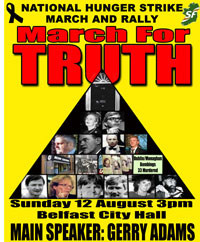26 July 2007 Edition
March for Truth - National Hunger Strike March & Rally
 The struggle for truth is the theme for this August’s National Hunger Strike march and rally on Sunday 12 August
The struggle for truth is the theme for this August’s National Hunger Strike march and rally on Sunday 12 AugustThe march will have three departure points in North, West and South Belfast and will proceed to Belfast City Hall for a rally, which will be addressed by Sinn Féin President Gerry Adams.
The objective of the rally is to raise awareness of the cost of Britain’s war on the Irish nationalist population of the North since the 1960s.
In the course of that war, the British Army, RUC and UDR/RIR carried out a relentless military campaign aimed at destroying the will of nationalists to struggle for their rights and for the independence of our country. That military campaign led to the deaths of many hundreds of Irish people.
When Britain was exposed in the international court of public opinion over its murder of unarmed civilians in Derry on Bloody Sunday and the Springhill massacre in Belfast in July 1972, tactics were changed.
Instead of using the British Army in the front line, the British reorganised their military forces and armed and trained the RUC to carry out undercover operations. These operations saw the RUC gun down IRA Volunteers in Armagh and Tyrone, as the British government under Margaret Thatcher went all out for a military victory.
Britain also unleashed its loyalist death squads, who targeted Catholics with impunity.
Recognising the threat that a politically resurgent Sinn Féin posed to British rule in Ireland, both the UDA and UVF, with the aid British intelligence operatives, targeted party activists. Many were killed, as were members of their families.
It is to shine the spotlight on the effects of Britain’s war in Ireland that this year’s rally has Truth as its theme.
There is a need to expose the way in which the state killed many nationalists and republicans with impunity. The judicial system never investigated the majority of incidents involving the deaths of nationalists and when they did they exonerated the killers.
Sinn Féin’s Cúige Uladh has identified the political and military aspects of Britain’s war in the North, such as the cover up of the killings, the refusal of the judiciary to investigate the state, collusion between the British and unionist death squads and the shoot-to kill policy. It is encouraging areas across the North to organise around these themes as a way of promoting August’s march and rally.
Cúige chair Brian Tumilty told An Phoblacht that the march will also focus on the ‘hierarchy of victims’ which meant that Catholics, nationalists and republicans, who were treated as second class citizens in life, were also viewed as second class citizens in death.
“In the past week we have heard that the Police Ombudsman’s office is to reinvestigate the shoot-to-kill policy of the 1980s because these killings weren’t properly looked at the time,” he said. “We have also seen how the Historical Enquiries Team (HET) carried out a sham investigation into the killing of Barney Watt by British paratroopers in 1971 and did nothing but leave a family incensed because they rubberstamped the lies told by Barney’s killers at the time.
“This treatment is unacceptable and thousands of republicans will make that point when we take our demand for truth to the streets of Belfast on 12 August.”


